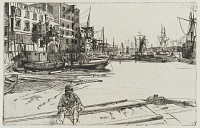Eagle Wharf | ||
| Number: | 50 | |
| Date: | 1859 | |
| Medium: | etching | |
| Size: | 140 x 217 mm | |
| Signed: | 'Whistler.' below centre | |
| Inscribed: | '1859.' at lower centre | |
| Set/Publication: | 'Thames Set', 1871 | |
| No. of States: | 1 | |
| Known impressions: | 73 | |
| Catalogues: | K.41; M.40; T.40; W.39 | |
| Impressions taken from this plate (73) | ||
TECHNIQUE
This is pure etching, with no drypoint.
PRINTING
Over seventy impressions have been located plus three from the cancelled plate. About 1862, Whistler recorded either the number of impressions printed, or more likely the number of impressions of some etchings in stock: 'Limehouse 10.
/ Tunnel pier 2. / Black Lion 8.
/ Graveur - 2
/ Thames Police. 20 / Tyzack 5' 19
19: [May 1862/1864?], GUW #12745, p. 38.
It is likely that the impressions acquired by Francis Seymour Haden, Sr (1818-1910) were among the earliest printed. They were printed in black ink; papers include a light green or blue 'antique' (pre-1800) laid paper now faded to off-white with 'I Honig Zoonen' watermark, ( ). A similar medium-weight greenish off-white laid paper was used for another impression acquired by Philippe Burty (1830-1890), possibly in Paris (
). A similar medium-weight greenish off-white laid paper was used for another impression acquired by Philippe Burty (1830-1890), possibly in Paris ( ). Another impression owned by Haden is on buff 'antique' laid with a lion watermark (
). Another impression owned by Haden is on buff 'antique' laid with a lion watermark ( ).
).
 ). A similar medium-weight greenish off-white laid paper was used for another impression acquired by Philippe Burty (1830-1890), possibly in Paris (
). A similar medium-weight greenish off-white laid paper was used for another impression acquired by Philippe Burty (1830-1890), possibly in Paris ( ). Another impression owned by Haden is on buff 'antique' laid with a lion watermark (
). Another impression owned by Haden is on buff 'antique' laid with a lion watermark ( ).
).Other early impressions include one given - or at least inscribed - to George Aloysius Lucas (1824-1909), which is on pale tan 'antique' laid ( ); one inscribed 'Early proof - 1st state' on pale grey oatmeal-texture wove paper (
); one inscribed 'Early proof - 1st state' on pale grey oatmeal-texture wove paper ( ); and one on a bluish off-white laid paper (
); and one on a bluish off-white laid paper ( ).
).
 ); one inscribed 'Early proof - 1st state' on pale grey oatmeal-texture wove paper (
); one inscribed 'Early proof - 1st state' on pale grey oatmeal-texture wove paper ( ); and one on a bluish off-white laid paper (
); and one on a bluish off-white laid paper ( ).
).Other papers include ivory laid paper removed from a book, which was used for two impressions ( ,
,  ); paper removed from a ledger with blue edges (
); paper removed from a ledger with blue edges ( ); a dark cream uneven and soiled sheet of 'antique' laid paper from a book (
); a dark cream uneven and soiled sheet of 'antique' laid paper from a book ( ); and soiled ivory laid paper (
); and soiled ivory laid paper ( ). Sometimes, but rarely, it was printed on wove paper (
). Sometimes, but rarely, it was printed on wove paper ( ).
).
 ,
,  ); paper removed from a ledger with blue edges (
); paper removed from a ledger with blue edges ( ); a dark cream uneven and soiled sheet of 'antique' laid paper from a book (
); a dark cream uneven and soiled sheet of 'antique' laid paper from a book ( ); and soiled ivory laid paper (
); and soiled ivory laid paper ( ). Sometimes, but rarely, it was printed on wove paper (
). Sometimes, but rarely, it was printed on wove paper ( ).
).A late impression, possibly from the edition printed by Frederick Keppel (1845-1912), is on a white laid paper ( ). Cancelled impressions are on cream or ivory wove paper (
). Cancelled impressions are on cream or ivory wove paper ( ,
,  ,
,  ).
).
 ). Cancelled impressions are on cream or ivory wove paper (
). Cancelled impressions are on cream or ivory wove paper ( ,
,  ,
,  ).
).
